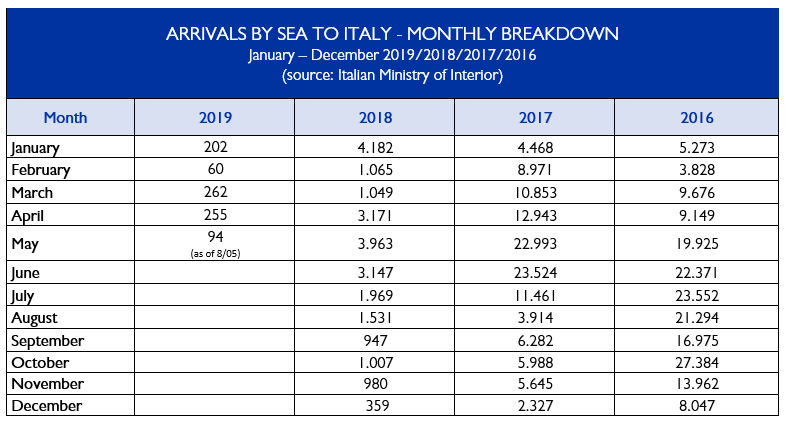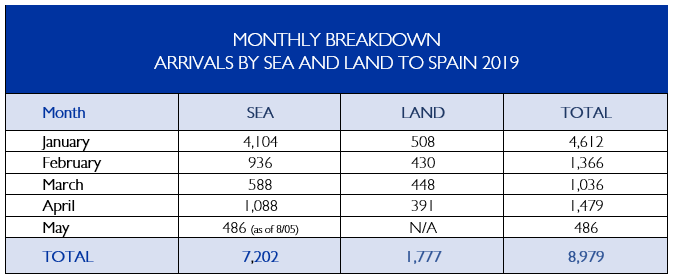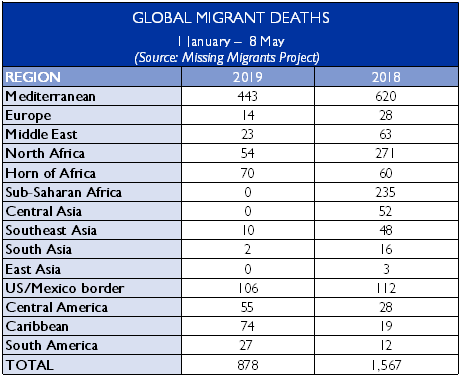-
Who we are
WHO WE AREThe International Organization for Migration (IOM) is part of the United Nations System as the leading inter-governmental organization promoting since 1951 humane and orderly migration for the benefit of all, with 175 member states and a presence in 171 countries.
-
Our Work
Our WorkAs the leading inter-governmental organization promoting since 1951 humane and orderly migration, IOM plays a key role to support the achievement of the 2030 Agenda through different areas of intervention that connect both humanitarian assistance and sustainable development.
What We Do
What We Do
Partnerships
Partnerships
- Where we work
-
Take Action
Take Action
Work with us
Work with us
Get involved
Get involved
- Data and Research
- 2030 Agenda
Mediterranean Migrant Arrivals Reach 17,000 in 2019; Deaths Reach 493
Geneva – During the day, Friday, IOM learned of at least two rescue operations occurring off the coasts of Libya and Tunisia, one involving the deaths of 50 migrants. IOM Tunisia notified the Organization of a shipwreck off the coast of Kerkenah, an Island close to Sfax, Tunisia. That vessel reportedly left from Zuwara, Libya. 16 survivors and at least 50 deaths have been reported so far in that incident. Shortly thereafter a second incident was reported when a Libyan Coast Guard unit returned another boat carrying 101 migrants, among them two women. Those migrants were taken to the Libyan city of Khums.
These latest deaths bring to 493 the total for 2019 to date, with 307 reported on the Central Mediterranean route between Libya and Italy. This compares with 620 deaths confirmed during the same period in 2018, including 383 deaths on the Libya-Italy route.
The International Organization for Migration (IOM) reports that 17,000 migrants and refugees have entered Europe by sea through 8 May, roughly a 30% decrease from the 24,492 arriving during the same period last year. Arrivals to both Spain and Greece account for almost 90% of all irregular Mediterranean arrivals thus far in 2019, with the balance arriving this year in Italy, Malta and Cyprus.
Yesterday, 66 migrants who departed from Libya were rescued off the coast of Italy. Thirty-six were rescued by the Italian Navy Two and taken to Augusta, Sicily today, while another 30 were rescued by the NGO ship "Mare Jonio" and brought to Lampedusa this morning.
Arrivals to Greece are the highest of any destination this year yet remain almost one-fifth lower in 2019 than the total from this same time last year. Arrivals to Spain in 2019 remain higher than those of this same period last year, although Spain’s totals have fallen considerably since 2019’s winter surge of January and early February.
Mediterranean Developments (as of Friday morning, 10 May)

IOM Italy
According to IOM Rome’s Flavio Di Giacomo, citing official Ministry of Interior figures, 873 migrants have arrived by sea to Italy in 2019. That total, through four months, is less than the total recorded for almost any single month between January 2016 and (see chart below) and November 2018, as well as during all the months of 2014 and 2015.
That arrival total compares with the 1,578 migrants returned to Libya through 8 May, according to IOM Libya.

IOM Spain
IOM Spain’s Ana Dodevska reported on Thursday (9/05) that sea arrivals in the Western Mediterranean are now at 7,202 men, women and children through 8 May. While that is almost 2,000 more arrivals to Spain through this same time last year, the IOM office notes that more than half of 2019’s arrivals landed in the year’s first 31 days, and more than two thirds within the year’s first 60 days (see chart below). Daily arrivals through the end of February averaged 85 men, women and children. During March, April and the first week of May, daily averages have dropped to just over 30 per day.

IOM Greece
IOM Greece’s Christine Nikolaidou reported on Thursday (9/05) that from Friday (03/05) up to date, the Hellenic Coast Guard (HCG) reported at least four incidents requiring search and rescue operation off the islands of Chios, Lesvos, Samos, Alexandroupoli and Kos. The HCG rescued a total of 163 migrants and transferred them to the respective ports.
Those arrivals were among some 292 IOM recorded during those days, bringing to 7,839 the total number of sea arrivals to Greece this year (see chart below).

* Unofficial data collected by IOM Greece and the Greek authorities of arrivals by sea.
Missing Migrants Project
2019 is the sixth year of IOM’s efforts to systematically record deaths on migration routes worldwide through its Missing Migrants Project. Since the beginning of 2014, the project has recorded the deaths of 31,821 individuals, including 878 in 2019 (see chart below).
Due to the challenges of collecting information about these people and the contexts of their deaths, the true number of lives lost during migration is likely much higher. Missing Migrants Project records should only be viewed as indicative of the risks associated with migration, rather than representative of the true number of deaths across time or geography.
This past week was marked by several tragedies in the Eastern and Western Mediterranean, in which at least 33 people lost their lives. In the Aegean Sea, a shipwreck on 3 May cost the lives of 12 Afghans when the boat in which they were travelling capsized off the coast of island of Ciplak, in Turkey’s province of Balikesir. The remains of four women and five children were recovered from the water by the Turkish Coast Guard, while three people remain missing. Five survivors were rescued and brought back to mainland Turkey.
In the Western Mediterranean, the Spanish NGO Caminando Fronteras reported that several shipwrecks took place between 22 April and 8 May. Four people fell overboard and drowned on 22 April in the Gibraltar Strait, off the coast of Fnideq, as reported by the nine survivors rescued by the Moroccan Navy.
During that same period, on 2 May, a pregnant woman drowned after the boat in which she was travelling with four others sank off the coast of Cap Espartel, Tangiers. On the same day, four people lost their lives in the Gibraltar Strait, while eight were rescued and brought back to Morocco.
On 4 May, the body of a 21-year-old Senegalese woman was recovered one mile south of the Port of Algeciras, in the Spanish province of Cádiz. Her brother, who lives in Málaga, was able to identify her. On 8 May, a boat in which 26 people were trying to reach mainland Spain capsized near the beach of Conil de la Frontera, Cádiz. A woman tragically drowned before the Guardia Civil could reach the boat and rescue those on board, and survivors reported that a child went missing.
Additionally, the NGO Alarm Phone reported that a boat sank on 1 May. The NGO received an alert in the early morning of 30 April, reporting that 12 people were missing after having left Morocco earlier that night. Alarm Phone informed authorities in Spain and Morocco and a search and rescue operation was launched. However, the boat was only found in the afternoon of 1 May. At that time, eight people had already fallen overboard and drowned. A woman died during the rescue operation, but her body could not be recovered. The NGO was able to speak with one of the three survivors on 2 May, who informed them that the people who drowned were from Senegal.
In Morocco, the NGO Alarm Phone Sahara shared an update regarding the vehicle accident which took place on 27 April near Oujda. New information indicates that 21 people lost their lives in this tragic accident, including 14 nationals of Côte d’Ivoire, three Malians and two Senegalese. The remains of two people have not been identified. Several women are among the dead, as well as a father who is survived by his two children.
On the US-Mexico border, the Missing Migrants Project team continued to investigate reports that several people from Ecuador went missing on the night of 13 April in the Río Bravo. The NGO 1800migrante has reported that three survivors have been located, in the custody of the US Border Patrol, while three bodies have been recovered from the Río Grande: the remains of Luis Oswaldo Quezada Aguilar were retrieved from the banks of the Río Bravo near Nuevo Laredo on 19 April, while the body of Héctor Leonardo González Godoy was found nearby on 24 April. On 5 May, US authorities recovered the remains of Myrian Alicia Paguay Mejía from the river near Nuevo Laredo.
Another tragedy was reported in the Río Bravo on 1 May: a family of four drowned when trying to cross to the US. Only the body of the youngest child, just 10 months old, was found at the time. A few days later, the body of a seven-year-old child was recovered from the banks of the river. A father and a girl remain missing. The remains of two more people, not connected to this incident, were found in Tamaulipas and Coahuila on 6 and 8 May. These latest tragedies bring to 22 the number of lives lost recorded by the MMP team in the Río Bravo since the beginning of this year. Nineteen of these deaths took place since 1 April.
On 4 May, a 30-year-old from Honduras – identified solely as “Dagoberto” – died trying to climb onto a freight train near Calzada Ignacio Zaragoza, in Colonia Tepeyac, Puebla, Mexico. His death was the 10th by train this year.
In total, at least 262 people have lost their lives in the Americas in 2019, compared with 171 recorded through this point in 2018.
Missing Migrants Project data are compiled by IOM staff based at its Global Migration Data Analysis Centre but come from a variety of sources, some of which are unofficial. To learn more about how data on migrants’ deaths and disappearances are collected, click here.

For latest arrivals and fatalities in the Mediterranean, click here. Learn more about the Missing Migrants Project.
See contacts here.
